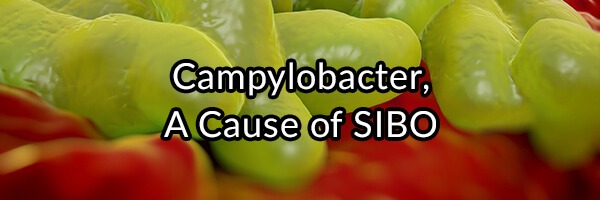Can one bout of food poisoning lead to SIBO? Cases of viral gastroenteritis have been linked to the development of SIBO, but what about food poisoning caused by bacterial toxins?
Campylobacter
Does this sound familiar? You just got over a bad case of food poisoning. For a few days, you were retching up everything you consumed and sat upon the porcelain throne purging your guts. You should not have eaten your college’s cafeteria food that day, but you were starving and late for class. A few weeks later you notice increased bloating and frequent diarrhea. You got over your food poisoning incident. Now you just got diagnosed with IBS by your doctor. How can one instance of food poisoning cause SIBO?
The Campylobacter genus is a Gram-negative, opportunistic spiral bacteria. Campylobacter jejuni is the species that is mainly associated with foodborne illnesses out of this genus. Since it is a gram negative bacteria, it also produces endotoxins. 1 2 Campylobacter jejuni is commonly found in animal feces, and naturally colonizes the digestive tract of many bird species. Campylobacter jejuni is also found in the digestive tracts of cattle as natural flora in lesser amounts. 3 Infection of Campylobacter jejuni usually results in self-limiting enteritis, abdominal pain, diarrhea, fever, and malaise. Symptoms usually persist for twenty-four hours and for at most a week. Rarely, Campylobacter jejuni infection can lead to Guillain-Barre syndrome, so make sure you eliminate it or support your body’s immune system as soon as possible. 4
Severe infections may cause bloody diarrhea, high fevers, and some require hospitalization and antibiotic therapy. Campylobacter jejuni also forms biofilms, so anti-biofilm protocols combined with antibiotic therapy may help speed up recovery rates from infection. 5 6 Most people recover from their exposure to the bacteria and the toxins it produces; some people, however, develop upper-gut infections or SIBO from their exposure.
Campylobacter jejuni and SIBO
Symptoms of an opportunistic Campylobacter jejuni infection usually appear within a few hours of the ingestion of compromised food products. Campylobacter jejuni produces a toxin (cytolethal distending toxin) that hinders lymphocytes for a short time, and slows down immune function so that the bacteria can further propagate. 7 Cytolethal distending toxin also creates MMC dysregulation, and for some people this can be what causes them to develop SIBO. They develop it from a lack of proper motility and underlying gut issues before accidental ingestion of the bacteria / toxins. Also, the greater the length and severity of the Campylobacter jejuni exposure the higher chance of developing SIBO. It appears that you may have a greater chance of developing SIBO each time you are exposed to Campylobacter jejuni and its toxins. 8
Also, Campylobacter jejuni and M. Smithii compete with one another in the intestinal tract. M. Smithii is important to our overall gut function because of their production of methane that helps to regulate the MMC. Only when we have an overgrowth of archaea, do we have a problem with constipation and SIBO-C. It appears that with this reduction of archaea, diarrhea is more likely to occur with less regulation of the MMC and increased hydrogen dominance. 9
Testing for Campylobacter jejuni
It is difficult to show that C. jejuni caused your SIBO after your bout with food poisoning unless the bacteria happen to take up residence inside your gut microbiome. You could, however, test for it during an active case of food poisoning. If it is caused by the bacteria, it should show up in a stool antigen test that tests your bodies immune reaction to the bacteria and its toxins. Also, if the bacteria implant themselves into your gut microbiome, a PCR or culture for the bacteria may work in determining if it is causing your issues. If your immune system is still reacting to the bacteria, a stool antigen test might also be positive for the bacteria. A biopsy of the intestines can tell if you are infected by the bacteria as well, but it is highly invasive. You can get a test for the antibodies you produce to the cytolethal distending toxin, but this test would not be able to determine the cause of your bodies reaction to the toxin. Therefore, the test cannot tell you if you have an active Campylobacter jejuni infection or if you were exposed to the bacteria specifically in the past.
There are many different causes of SIBO. Campylobacter jejuni infection / poisoning is only one such way to develop the debilitating condition. Knowledge of SIBO and its causes is growing, but there are still a lot of gastroenterologists that are clueless when it comes to the disease and how to deal with it. Here at Fix Your Gut we are always researching causes of disease so that we can better understand how to counsel you on your journey back to proper health.
- http://www.ncbi.nlm.nih.gov/books/NBK8417/ ↩
- http://www.ncbi.nlm.nih.gov/pubmed/20593269 ↩
- http://www.ncbi.nlm.nih.gov/books/NBK8417/ ↩
- http://www.ncbi.nlm.nih.gov/books/NBK8417/ ↩
- http://www.ncbi.nlm.nih.gov/books/NBK8417/ ↩
- http://aem.asm.org/content/73/6/1908.abstract ↩
- http://onlinelibrary.wiley.com/doi/10.1111/nmo.12118/pdf ↩
- http://onlinelibrary.wiley.com/doi/10.1111/nmo.12118/pdf ↩
- http://onlinelibrary.wiley.com/doi/10.1111/nmo.12118/pdf ↩







I have been really dang sick, weak amd nauseous, for 6 months. Only just now was I finally diagnosed with SIBO. Nobody ran any proper tests until 2 months in. Anti nausea pills don’t help. They also gave me PPIs. Again, no help. I am now extremely deficient of vitamin D, which causes its own mess of problems. I think I have been suffering from SIBO all this time, and my symptoms just don’t let up.
I was diagnosed in 2021 and am still dealing with this. I’ve lost 100# and no end in site
so what do you do about it if you have it???
pretty important thing you left out there..
Follow my SIBO protocols outlined on my blog or book or get coaching.
If I remember correctly, d-limonene is supposed to help with campylobacter right?
Yes, http://www.ncbi.nlm.nih.gov/pubmed/19070381, http://www.ncbi.nlm.nih.gov/pubmed/20183064